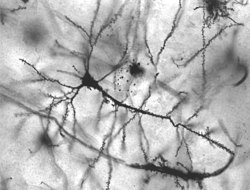Neurological disorder

Editor-In-Chief: Prab R Tumpati, MD
Obesity, Sleep & Internal medicine
Founder, WikiMD Wellnesspedia &
W8MD's medical weight loss NYC, sleep center NYC
Philadelphia medical weight loss and Philadelphia sleep clinics
| Neurological disorder | |
|---|---|

| |
| Synonyms | N/A |
| Pronounce | N/A |
| Specialty | N/A |
| Symptoms | Varies widely depending on the specific disorder; may include headache, muscle weakness, seizures, numbness, pain, memory loss, and cognitive dysfunction |
| Complications | Disability, reduced quality of life, psychological disorders |
| Onset | Can occur at any age, depending on the specific disorder |
| Duration | Can be acute, subacute, or chronic |
| Types | N/A |
| Causes | Genetic disorders, congenital abnormalities, infections, lifestyle factors, trauma, autoimmune diseases, degenerative diseases |
| Risks | Family history, age, lifestyle factors, environmental factors |
| Diagnosis | Neurological examination, imaging studies (e.g., MRI, CT scan), electrophysiological tests (e.g., EEG, EMG) |
| Differential diagnosis | Psychiatric disorders, metabolic disorders, systemic diseases |
| Prevention | N/A |
| Treatment | Medication, surgery, physical therapy, occupational therapy, speech therapy, psychotherapy |
| Medication | N/A |
| Prognosis | Varies widely; some conditions are manageable, others may be progressive or life-threatening |
| Frequency | Common; affects millions of people worldwide |
| Deaths | N/A |
Neurological disorders represent a category of diseases that affect the brain, spinal cord, and nerves. These structures control various facets of human physiology, including movement, speech, and sensory perception. Disturbances in their function can lead to a wide range of clinical manifestations.

Introduction
Neurological disorders encompass hundreds of conditions, including stroke, Alzheimer's disease, Parkinson's disease, epilepsy, multiple sclerosis, and migraine, among others. They can be caused by a variety of factors, including genetic mutations, injuries, infections, tumors, blood flow disruptions, and autoimmune processes.
Symptoms and Signs
Given the broad nature of neurological disorders, the symptoms vary widely based on the condition and the specific areas of the nervous system affected. Common signs and symptoms include:
- Changes in sensory perception (e.g., numbness, tingling)
- Difficulties with coordination and balance
- Impairments in speech and language
- Seizures
- Muscle weakness or paralysis
- Cognitive changes (e.g., memory issues, confusion)
- Mood alterations
Diagnosis
The diagnosis of a neurological disorder begins with a thorough medical history and physical examination, which typically includes a detailed neurological examination. Further diagnostic tests might involve blood tests, imaging studies (MRI, CT scan), and specialized tests like an electroencephalogram (EEG) or a lumbar puncture.
Treatment
Treatment strategies for neurological disorders depend on the specific condition, its severity, and the individual patient's circumstances. Therapies might include medication, lifestyle changes, physical therapy, occupational therapy, speech therapy, and in some cases, surgery. Research continues into new treatments, including advanced drug therapies, stem cell treatment, and neurorehabilitation techniques.
References
<references />
See Also
|
|
|
WikiMD neurology
External links
- Comprehensive information from the National Institute of health.
A | B | C | D | E | F | G | H | I | J | K | L | M | N | O | P | Q | R | S | T | U | V | W | X | Y | Z
Ad. Transform your life with W8MD's Budget GLP-1 injections from $49.99


W8MD offers a medical weight loss program to lose weight in Philadelphia. Our physician-supervised medical weight loss provides:
- Weight loss injections in NYC (generic and brand names):
- Zepbound / Mounjaro, Wegovy / Ozempic, Saxenda
- Most insurances accepted or discounted self-pay rates. We will obtain insurance prior authorizations if needed.
- Generic GLP1 weight loss injections from $49.99 for the starting dose of Semaglutide and $65.00 for Tirzepatide.
- Also offer prescription weight loss medications including Phentermine, Qsymia, Diethylpropion, Contrave etc.
NYC weight loss doctor appointmentsNYC weight loss doctor appointments
Start your NYC weight loss journey today at our NYC medical weight loss and Philadelphia medical weight loss clinics.
- Call 718-946-5500 to lose weight in NYC or for medical weight loss in Philadelphia 215-676-2334.
- Tags:NYC medical weight loss, Philadelphia lose weight Zepbound NYC, Budget GLP1 weight loss injections, Wegovy Philadelphia, Wegovy NYC, Philadelphia medical weight loss, Brookly weight loss and Wegovy NYC
|
WikiMD's Wellness Encyclopedia |
| Let Food Be Thy Medicine Medicine Thy Food - Hippocrates |
Medical Disclaimer: WikiMD is not a substitute for professional medical advice. The information on WikiMD is provided as an information resource only, may be incorrect, outdated or misleading, and is not to be used or relied on for any diagnostic or treatment purposes. Please consult your health care provider before making any healthcare decisions or for guidance about a specific medical condition. WikiMD expressly disclaims responsibility, and shall have no liability, for any damages, loss, injury, or liability whatsoever suffered as a result of your reliance on the information contained in this site. By visiting this site you agree to the foregoing terms and conditions, which may from time to time be changed or supplemented by WikiMD. If you do not agree to the foregoing terms and conditions, you should not enter or use this site. See full disclaimer.
Credits:Most images are courtesy of Wikimedia commons, and templates, categories Wikipedia, licensed under CC BY SA or similar.
Translate this page: - East Asian
中文,
日本,
한국어,
South Asian
हिन्दी,
தமிழ்,
తెలుగు,
Urdu,
ಕನ್ನಡ,
Southeast Asian
Indonesian,
Vietnamese,
Thai,
မြန်မာဘာသာ,
বাংলা
European
español,
Deutsch,
français,
Greek,
português do Brasil,
polski,
română,
русский,
Nederlands,
norsk,
svenska,
suomi,
Italian
Middle Eastern & African
عربى,
Turkish,
Persian,
Hebrew,
Afrikaans,
isiZulu,
Kiswahili,
Other
Bulgarian,
Hungarian,
Czech,
Swedish,
മലയാളം,
मराठी,
ਪੰਜਾਬੀ,
ગુજરાતી,
Portuguese,
Ukrainian

